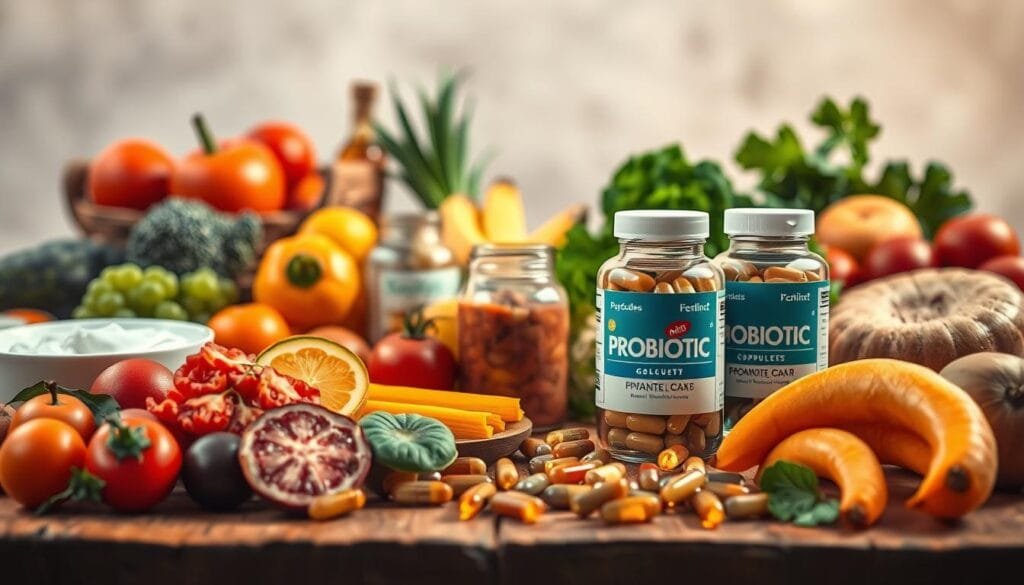Currently Empty: RM0.00
Welcome to Wellness Concept’s comprehensive guide on finding the right probiotics for your unique needs. These beneficial microorganisms play a vital role in supporting digestive wellness and overall health, making them a cornerstone of modern wellness routines.
Your gut is home to trillions of bacteria that influence nutrient absorption, immune function, and even mood. A balanced microbiome ensures these tiny workers thrive, but factors like diet or stress can disrupt their harmony. This is where high-quality probiotics step in.
With countless options available, selecting effective probiotics requires more than grabbing the first bottle you see. Strains like Lactobacillus or Bifidobacterium target different concerns, while CFU counts and storage methods impact potency. Wellness Concept’s experts simplify this process, offering science-backed strategies to match products with personal goals.
Whether you’re aiming to boost immunity or ease digestion, this guide unpacks key details—from label decoding to lifestyle compatibility—so you can make confident choices for lasting results.
Key Takeaways
- Probiotics support gut balance, immunity, and nutrient absorption.
- Strain diversity and CFU counts determine a product’s effectiveness.
- Storage requirements vary—some need refrigeration, others don’t.
- Food sources like yogurt differ from supplements in potency and strain types.
- Personal health goals should guide probiotic selection.
Introduction to Probiotics and Gut Health
The human body hosts a vibrant community of microscopic allies working behind the scenes. These tiny helpers—especially in the digestive tract—play surprising roles beyond basic nutrient processing.
What Are Probiotics?
Probiotics are live microorganisms that offer health benefits when consumed regularly. Most are bacteria resembling those naturally found in your intestines. Think of them as reinforcements for your body’s existing good bacteria.
Common strains like Lactobacillus and Bifidobacterium dominate research for their digestive benefits. Yeast-based options like Saccharomyces boulardii also show promise. Together, they crowd out harmful pathogens while strengthening intestinal walls.
The Role of the Gut Microbiome
Your gut houses trillions of microbes—bacteria, fungi, and viruses—forming a complex ecosystem. This gut microbiome doesn’t just break down food. It trains your immune system, produces vitamins, and even communicates with your brain.
Imbalances here can affect everything from skin clarity to mood stability. For those exploring probiotics for stomach digestion, targeted strains help restore harmony. They boost nutrient absorption and reduce inflammation naturally.
Beyond digestion, studies suggest these microbes influence oral health and skin conditions when applied topically. Their versatility makes them a cornerstone of modern wellness strategies.
Understanding Probiotics: Benefits and Key Factors
Modern wellness strategies increasingly recognize probiotics as vital players in maintaining bodily harmony. Their influence stretches far beyond basic digestion, offering targeted support for diverse health needs.

Health Benefits of Probiotics
Scientifically validated advantages include relief for conditions like irritable bowel syndrome (IBS) and ulcerative colitis. Studies show specific strains reduce antibiotic-associated diarrhea by up to 60% in adults. Other notable effects:
- Immune system enhancement through increased antibody production
- Inflammation reduction linked to chronic conditions
- Improved cholesterol metabolism with strains like Lactobacillus acidophilus
Key Factors When Selecting a Probiotic
Not all probiotics work equally for every concern. For digestive issues like IBS, Bifidobacterium infantis demonstrates particular effectiveness. Those seeking immune support might prioritize Lactobacillus rhamnosus. Critical considerations include:
- Clinical evidence supporting the strain for your condition
- Survivability through stomach acid
- Synergy with prebiotics for enhanced effects
Scientific Research and Evidence
A 2023 review in Gut Microbes confirmed probiotics’ role in managing IBS symptoms. Emerging studies explore their impact on mental health through neurotransmitter regulation. While research grows, experts advise:
“Focus on strains with human trials matching your health goals rather than general claims.”
Current evidence strongly supports probiotic use for digestive and immune concerns, with ongoing investigations into cardiovascular and neurological benefits.
How to choose a probiotic? Tips and Considerations
Smart decisions about microbial allies start with understanding two critical elements: what’s inside the bottle and how to preserve its benefits. Let’s break down the essentials for maximizing effectiveness.
Evaluating CFU Counts and Strain Quality
Colony-forming units (CFUs) indicate live microorganism numbers. Aim for products with 1 billion CFUs or higher—this accounts for potential losses during shipping. Check labels for guarantees of potency through expiration dates, not just manufacturing time.
Prioritize strains like Lactobacillus or Bifidobacterium with documented benefits. Capsules with delayed-release coatings often survive stomach acid better. For example, Bacillus coagulans survives room-temperature storage while supporting digestion.
Storage and Expiration: What to Look For
Heat-sensitive products require refrigeration to maintain viable cultures. Look for dark glass bottles or blister packs that block light and moisture. Expiration dates matter—viability decreases by 10-20% monthly in suboptimal conditions.
Make sure labels specify storage instructions clearly. A 2023 study found refrigerated strains retained 94% potency at six months versus 67% in non-cooled versions. Rotate stock regularly and avoid warm storage areas like bathroom cabinets.
Navigating Probiotic Products: Foods and Supplements
Fueling your gut with beneficial bacteria can take two delicious paths: plate or capsule. Each approach offers unique advantages for maintaining microbial balance, but their applications differ based on lifestyle and health needs.

Probiotic-Rich Foods Versus Supplements
Fermented foods like yogurt, kimchi, and kefir deliver live cultures alongside natural nutrients. These items create a protective environment where bacteria produce inflammation-fighting short-chain fatty acids. A single serving of sauerkraut can contain up to 28 distinct strains—far exceeding most supplements.
| Feature | Probiotic Foods | Supplements |
|---|---|---|
| Strain Diversity | Up to 30+ strains | Typically 1-10 strains |
| Additional Nutrients | Fiber, vitamins, minerals | Often strain-specific |
| Convenience | Requires daily consumption | Portable, precise dosing |
For those needing targeted support, supplements offer concentrated CFU counts in forms like chewables or delayed-release capsules. However, they lack the fiber found in miso or tempeh that feeds existing gut bacteria. Nutritionists often recommend combining both approaches:
“Pair morning yogurt with a prebiotic-rich snack like garlic-roasted asparagus—it’s like fertilizer for your microbial garden.”
Consider dietary restrictions and storage needs. Lactose-free options include kombucha and coconut kefir, while shelf-stable powders suit frequent travelers. Always consult healthcare providers when introducing new products to your diet.
Expert Advice from Wellness Concept
Navigating the world of microbial support becomes simpler with professional guidance. Wellness Concept combines scientific rigor with personalized care to help individuals achieve optimal gut health through tailored solutions.
Contact Information and Support
For questions about taking probiotics or selecting strains, reach Wellness Concept’s specialists via WhatsApp at +60123822655. This direct line connects you to experts who analyze medical history, dietary preferences, and health objectives to recommend suitable options.
Business Hours and Consultation Details
Assistance is available weekdays 9:30 AM–6:30 PM and weekends 10:00 AM–5:00 PM. These extended hours accommodate busy schedules while ensuring access to evidence-based advice. Consultations address concerns like:
- Compatibility with existing medications
- Strategies for strengthening the immune system
- Managing chronic digestive conditions
While probiotics benefit many, consulting a doctor remains crucial—especially for those with compromised immunity. Wellness Concept’s team collaborates with healthcare providers to ensure safe, effective protocols. Their approach prioritizes strains backed by clinical evidence while considering individual lifestyles.
People exploring microbial supplements gain peace of mind through structured support. Whether optimizing digestion or enhancing overall wellness, expert guidance helps avoid trial-and-error approaches. Connect today to create a plan aligning with your body’s unique needs.
Conclusion
Maintaining gut health through probiotics requires smart decisions tailored to your body’s unique needs. Focus on products with clinically studied strains like Lactobacillus or Bifidobacterium, and verify CFU counts match your goals—whether addressing occasional diarrhea or supporting overall balance.
While temporary bloating or gas might occur initially, these often signal that good bacteria are establishing themselves. Those with irritable bowel syndrome or immune concerns should consult a doctor before starting any supplement.
Proper storage ensures potency—refrigerate heat-sensitive capsules and check expiration dates. Pairing probiotics with prebiotics through dietary choices like garlic or oats can enhance their effects over time.
Consistent use helps cultivate a resilient microbiome, laying the foundation for lasting wellness. Remember: quality matters more than hype. Trust products backed by science, and let your gut guide your journey toward better health.
FAQ
What’s the difference between probiotics and prebiotics?
Probiotics are live microorganisms that support gut health, while prebiotics are fibers that feed these beneficial bacteria. Foods like bananas and garlic contain prebiotics, which help probiotics thrive in the digestive system.
How can someone identify high-quality probiotic supplements?
Look for products with clear labeling of CFU counts (colony-forming units) and specific strains, such as Lactobacillus or Bifidobacterium. Reputable brands like Culturelle or Align often list expiration dates and storage requirements to ensure potency.
Are there specific probiotic strains for digestive issues like bloating?
Yes. Strains like Bifidobacterium lactis HN019 or Lactobacillus plantarum may reduce bloating and gas. Research suggests checking labels for strains studied for gastrointestinal benefits, especially for conditions like irritable bowel syndrome.
Can probiotic-rich foods replace supplements?
Fermented foods like yogurt, kefir, or kimchi provide natural probiotics. However, supplements offer higher, standardized doses for targeted support. Combining both can enhance gut microbiome diversity.
Do probiotics interact with medications or health conditions?
Some strains might affect immune-compromised individuals or interact with antibiotics. Consulting a doctor before use ensures safety, particularly for those with chronic conditions or undergoing medical treatments.
How long does it take for probiotics to show effects?
Results vary, but many notice improvements in digestion or immune function within 2–4 weeks. Consistency is key—daily intake helps maintain a balanced gut environment.
What storage methods protect probiotic potency?
Refrigeration preserves live cultures in some products, while shelf-stable options like Renew Life use protective packaging. Always check labels for storage instructions to avoid degraded quality.
Where can individuals get personalized probiotic advice?
Wellness Concept offers consultations at +60123822655 during business hours (Mon–Sat, 9 AM–6 PM). Their experts guide strain selection based on health goals and scientific evidence.


